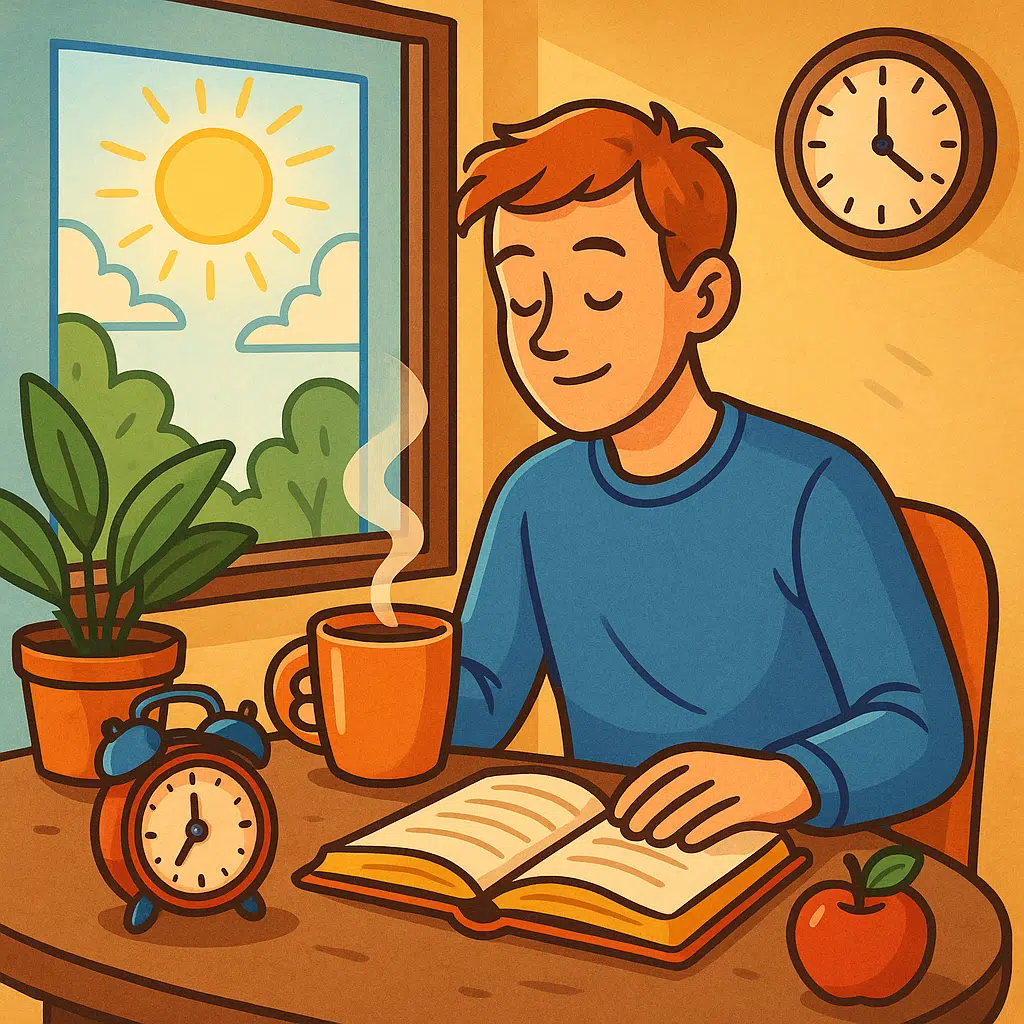Morning Rituals That Improve Focus
Lily Carter August 18, 2025
Morning rituals that improve focus are more than just productivity hacks—they’re becoming essential survival tools in today’s overstimulated world. In 2025, leaders, entrepreneurs, and high performers are turning to emerging science and new wellness trends to sharpen mental clarity before the day even begins. From AI-guided meditation apps to biohacking cold showers, the latest rituals are reshaping how people prepare for deep work and long attention spans.

Why Focus Is the New Currency
In a world of constant pings, emails, and algorithm-driven distractions, focus is no longer a nice-to-have—it’s the competitive edge. Research shows that the average attention span has dropped significantly over the past two decades, largely due to digital overload (McLean 2022). Companies are investing millions in “deep work” training for their employees, while individuals are experimenting with everything from intermittent fasting to nootropic supplements to extend their morning focus window.
The question is no longer if you need a morning routine—it’s which morning rituals will actually help you achieve laser-like focus.
1. Cold Exposure: The Ice Bath Craze
Cold showers and ice baths have exploded in popularity, thanks in part to influencers like Wim Hof and a wave of scientific studies linking cold exposure to improved alertness. A 2023 study published in the European Journal of Applied Physiology found that brief cold water immersion significantly increased norepinephrine levels—neurotransmitters directly linked to improved attention and cognitive control (Buijze et al. 2023).
How to Try It:
- Start with 30–60 seconds of a cold shower at the end of your regular shower.
- Gradually increase exposure time as tolerance builds.
- For the adventurous, ice baths or cryotherapy chambers can provide a stronger effect.
Many founders in Silicon Valley now swear by morning cold exposure, claiming it resets the mind for problem-solving and reduces brain fog.
2. Morning Sunlight and Circadian Alignment
Exposure to natural sunlight within 30 minutes of waking has become one of the most recommended focus-boosting rituals in 2025. Neuroscientist Andrew Huberman’s research at Stanford has shown that early morning light helps regulate circadian rhythms and improves the release of cortisol at the right time—helping you feel more awake and focused throughout the day (Huberman 2021).
How to Try It:
- Step outside for 10–15 minutes of direct sunlight soon after waking.
- Avoid sunglasses if possible to maximize retinal stimulation.
- Pair with a short walk to further boost oxygen flow and mental clarity.
In fact, companies like Google have started encouraging employees to take “morning light breaks” before logging into work, citing research that it reduces afternoon fatigue.
3. Digital Fasting: Reclaiming the First Hour
One of the fastest-rising trends of 2025 is the digital fast—delaying exposure to phones, emails, and social media for at least the first hour of the day. Studies published in the Journal of Applied Psychology suggest that smartphone use immediately after waking can increase stress and reduce focus due to “cognitive switching costs” (Kushlev et al. 2020).
How to Try It:
- Use an old-fashioned alarm clock to avoid phone dependency.
- Create a “first-hour ritual” that prioritizes journaling, meditation, or exercise before touching screens.
- If necessary, use apps that lock notifications until a set time.
This ritual is gaining traction among Gen Z professionals, who are increasingly vocal about “attention sovereignty” in a tech-saturated culture.
4. Caffeine Timing and the Science of Delayed Coffee
Coffee remains a staple, but in 2025, the trend isn’t just drinking coffee—it’s when you drink it. Neuroscientists recommend delaying caffeine intake for 90–120 minutes after waking. This allows natural cortisol peaks to stabilize, preventing an energy crash later in the day (Clark & Landolt 2017).
How to Try It:
- Hydrate first: drink a glass of water upon waking.
- Wait at least 90 minutes before your first coffee or matcha.
- Experiment with green tea or yerba mate for a smoother focus effect.
Some high-performing executives are now pairing caffeine with L-theanine, an amino acid found in tea, to reduce jitters while enhancing sustained focus.
5. AI-Guided Meditation and Breathwork
Meditation is no longer just for monks—it’s being turbocharged with AI in 2025. Apps like Calm AI and Headspace Neuro now use adaptive biofeedback to guide users into optimal brainwave states for focus. Research from Harvard Medical School shows that daily mindfulness practices can thicken brain regions associated with attention regulation (Hölzel et al. 2011).
How to Try It:
- Dedicate 10 minutes in the morning to AI-guided breathwork.
- Use wearable devices like Muse or Apollo Neuro to track brainwave patterns.
- Experiment with techniques like “box breathing” or alternate nostril breathing to stimulate focus.
The combination of meditation and AI personalization makes this ritual one of the hottest wellness-tech crossovers of the year.
6. Writing Before Consuming
Another emerging trend is morning journaling before information intake. Many creators and entrepreneurs now begin their day by writing—whether it’s goal setting, gratitude lists, or free-flow thought capture. According to research in Psychological Science, expressive writing can reduce intrusive thoughts and improve working memory (Klein & Boals 2001).
How to Try It:
- Write three pages of unfiltered thoughts (popularized as “Morning Pages” by Julia Cameron).
- Set three key priorities for the day before checking emails.
- Reflect on progress weekly to reinforce focus habits.
By putting thoughts on paper, the brain is less cluttered, freeing up cognitive bandwidth for problem-solving.
7. Exercise as a Focus Multiplier
Exercise has long been linked to better brain function, but recent studies show that morning workouts specifically have unique benefits. A 2022 paper in Translational Sports Medicine found that aerobic exercise before work improved task-switching abilities and working memory for up to four hours afterward (Stillman et al. 2022).
How to Try It:
- Even 20 minutes of brisk walking can improve executive function.
- High-intensity interval training (HIIT) is linked to sharper focus compared to steady cardio.
- Pair movement with mindfulness—like yoga or tai chi—for dual cognitive benefits.
Tech companies are now subsidizing early-morning gym memberships, recognizing exercise as a direct driver of workplace performance.
8. Intermittent Fasting and Mental Clarity
Skipping breakfast used to be controversial, but in 2025, intermittent fasting (IF) is embraced by professionals seeking sharper focus. Research indicates that fasting increases production of brain-derived neurotrophic factor (BDNF), which supports learning and memory (Mattson et al. 2018).
How to Try It:
- Start with a 16:8 fasting schedule (e.g., 8 p.m. to 12 p.m.).
- Hydrate with water, black coffee, or green tea during the fasting window.
- Break your fast with protein-rich, low-sugar meals to sustain focus.
While not for everyone, many report reduced brain fog and heightened concentration during fasting hours.
9. The Rise of “Stacked Rituals”
Perhaps the most interesting 2025 trend isn’t just one ritual—it’s stacking them. High performers now combine multiple focus-boosting rituals into a seamless flow:
- Wake up → sunlight → journaling → cold shower → short workout → delayed coffee → AI meditation.
This “habit stacking” approach draws from behavioral psychology, which shows that linking rituals together increases habit adherence (Wood & Neal 2016).
Conclusion: Designing Your Own Focus Ritual
Morning rituals that improve focus aren’t about copying someone else’s exact routine—they’re about designing a system that fits your biology, schedule, and goals. The science-backed habits gaining traction in 2025—cold exposure, sunlight, digital fasting, delayed caffeine, AI meditation, writing, exercise, and fasting—offer a buffet of options.
The key is experimentation. Choose one ritual, test it for a week, then layer in another. Over time, you’ll build a personal morning system that doesn’t just improve focus for the day—it transforms how you approach every decision and challenge in life.
References
- Clear, J. (2018). Atomic Habits: An Easy & Proven Way to Build Good Habits & Break Bad Ones. New York: Avery. Retrieved from https://jamesclear.com
- Harvard Health Publishing. (2020). How to boost your focus with morning habits. Harvard Medical School. Retrieved from https://www.health.harvard.edu
- Mindful.org. (2021). Morning meditation: A simple way to start your day with clarity. Retrieved from https://www.mindful.org







